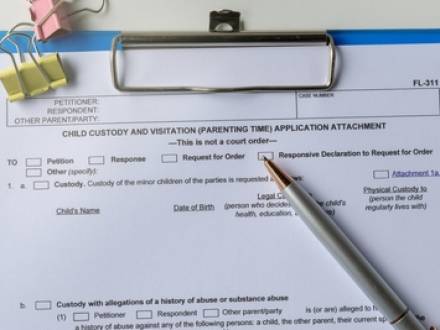How Virginia Custody Orders Can Affect I-130 Family Petitions
 Virginia families can be surprised and dismayed to learn that a state custody order issued by a Juvenile and Domestic Relations Court can directly affect a federal immigration petition, such as an I-130 Petition for Alien Relative. Custody, visitation, and parental rights are state matters, and immigration issues are federal, but USCIS can use these state orders to verify family relationships, determine who qualifies as a "child," and evaluate the stability of a household.
Virginia families can be surprised and dismayed to learn that a state custody order issued by a Juvenile and Domestic Relations Court can directly affect a federal immigration petition, such as an I-130 Petition for Alien Relative. Custody, visitation, and parental rights are state matters, and immigration issues are federal, but USCIS can use these state orders to verify family relationships, determine who qualifies as a "child," and evaluate the stability of a household.
When state court orders are unclear, conflicting, or incomplete, I-130 petitions can be delayed, denied, or sent for Requests for Evidence (RFEs). A poorly-written or outdated custody order can delay an I-130 for months, even leading to a denial. If you have an I-130 petition in the works, you must understand how state custody orders can intersect with federal immigration issues. A national immigration attorney from Immigration Legal Advisors, PLLC can help ensure your custody orders do not derail your I-130 family petition.
What is an I-130 Petition for Alien Relative?
The I-130 petition is the first step for a U.S. citizen or permanent resident to sponsor a family member to immigrate to the United States. The purpose of the petition is to establish a legal relationship between the petitioner and the alien relative for the purpose of immigration. The specific relatives who are eligible to be sponsored will depend on whether the petitioner is a U.S. citizen or a permanent resident.
A U.S. citizen may file a petition for a spouse, unmarried children under the age of 21, unmarried sons and daughters 21 or older, married sons and daughters of any age, siblings, and parents. A lawful permanent resident (Green Card holder) can file a petition for a spouse or an unmarried child of any age.
Why Do Virginia Custody Orders Matter in I-130 Cases?
The USCIS must verify that the parent-child relationship meets the federal definition of "child" under immigration laws. Virginia custody orders determine who has legal custody of a child (the right to make decisions), physical custody of a child (actual physical care), and parent-child continuity.
Parent-child continuity shows that the relationship is real and not being used solely for immigration purposes. A Virginia custody order could be inconsistent with the information provided on the I-130 form. In that case, USCIS could issue a Request for Evidence or question whether the petitioner has the authority to sponsor the child.
Are Federal Definitions of a "Child" Different from Virginia’s Definition?
Under immigration law, a "child" includes biological children, stepchildren (if the marriage occurred before the child turned 18), adopted children, and certain legitimized children whose paternity has been formally established. Virginia custody orders use terms such as primary physical custody, sole legal custody, or joint legal custody, which do not always align with federal terminology. Immigration officers are likely to request additional evidence when the custody arrangement is complex. Specifically, these particular orders or issues can interfere with an I-130 petition:
- Temporary custody orders may not be sufficient for USCIS to consider an I-130.
- Consent orders, when vague or incomplete, may not clearly establish legal custody.
- A stepchild’s other biological parent may retain rights that are not disclosed.
- Modified court orders can create confusion.
- An order may lack signatures or a judge’s stamp.
- An order does not clearly name the legal custodian.
- Two custody orders conflict with one another.
- A parent subject to a two-year protective order may have his or her household stability questioned by USCIS.
- A parent refuses to provide the order to USCIS for review.
Contact a Fairfax County, VA Immigration Lawyer
Virginia families should always make sure custody issues are clear before filing the I-130 to avoid conflicts between custody orders and immigration cases. An experienced Herndon, VA family immigration attorney from Immigration Legal Advisors, PLLC can help you correct any potential issues before they reach USCIS. Attorney Ruiz has more than 20 years of experience, speaks both English and Spanish, and offers a high level of support for his clients. Call 571-441-2233 to schedule your initial attorney meeting.





